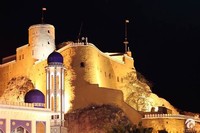Facts about Oman

Oman's capital, Muscat, and the other main towns are all located along the narrow coastal plain.

Due largely to its remote location and the uncommon variety of Islam that developed there centuries ago, Oman has a very unique history and culture extending into the present day.

The hospitality shown by Omanis to visitors, especially those from other cultures, may surpass the effusive, garden-variety brand of other residents on the peninsula.

After one last, brief invasion a few years later by Persia, Oman was free for good of foreign-occupying powers.

American and British bombing raids were launched in 1991 from Oman against Iraq in the Gulf War.

Arab tribes moved into Oman, probably from Yemen, and took control of the area by the seventh century C.E.

Oman has maintained peaceful ties on the Arabian Peninsula ever since ending another tribal rebellion in the southwest in 1982 by forging a treaty with Yemen.

Some portions of these communities date back to the nineteenth century when Oman was a colonizing power and imported workers from overseas territories.

The top export after petroleum is fish, most of which is sold to Oman's peninsular neighbors.

The initial oil discoveries were made in the early 1960s by European companies, but since 1974 the Omani government has held 60 percent of the national oil company, the country's sole producer.

The British slowly brought about a collapse of Muscat and Oman's "empire" by the end of the nineteenth century without use of force.

Centuries ago the area of Oman and Yemen was known for its production of frankincense, a tree resin that was used in religious ceremonies and was extremely costly.

About 80 percent of Oman (usually pronounced "o-MAHN" in English) is covered by a broad, rocky, barren, and mainly flat desert, the Rub al-Khali, the same vast expanse that dominates southern Saudi Arabia.

Through gradual encroachment on its overseas holdings economically and politically, they caused Oman to retreat to its homeland.

Oman's oil revenue has been consistently invested in the national infrastructure, particularly roads, schools, hospitals, and utilities.

Ibadhism has sometimes been cited as a factor that has isolated Oman as much as geography.

Oman has never been a member of the Organization of Petroleum Exporting Countries (OPEC).

Omanis tend to think of themselves as unique among the peoples of their vicinity and also see themselves as diplomats on the group, tribal, national, and international levels.

Resembling in shape a figurehead on a ship's prow, the Sultanate of Oman juts sharply from the southeast coast of the Arabian Peninsula into the Arabian Sea.

In 1970, almost certainly with British backing, he was overthrown by his son, the present ruler, Qaboos bin Said Al Said, and the country declared independence the following year as the Sultanate of Oman.

By the middle of the eighth century C.E., they were practicing a unique brand of the faith, Ibadhism, which remains a majority sect only in Oman.

In ancient history, the region of Oman was known principally for its copper mining, an activity still pursued in the present.